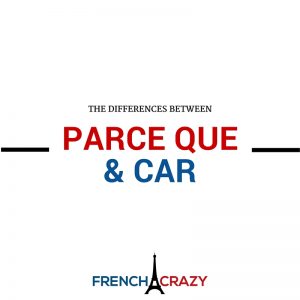 In French, what’s the difference between parce que, car, en effet, and puisque? Many students have a problem between these words because they are used in very similar situations, so I’ll offer a quick explanation!
In French, what’s the difference between parce que, car, en effet, and puisque? Many students have a problem between these words because they are used in very similar situations, so I’ll offer a quick explanation!
Parce Que
Parce que introduces a cause or reason. It’s also less formal and more universally accepted as the English equivalent for the word because. Parce que has the ability to start a sentence which is something you can’t do with car.
Take a look at a few example sentences using parce que:
La pomme? Je l’ai mangée parce que j’avais faim.
The apple? I ate it because I was hungry.
Parce qu’elle est mignonne, elle gagne plus que Pauline.
Because she is cute, she earns more than Pauline.
Car
Car is a justification or explanation of something. It is definitely more formal than parce que and is written more than spoken. In English this could be translated into for or because.
Méfie-toi car il est violent.
Be wary for he is violent.
Puisque
Puisque could replace both parce que and car but its usage implies that the fact is already known or very obvious. In English, puisque is best represented by the word “since,” and it can start a sentence.
Vous ne pouvez pas l’acheter puisqu’il n’y a pas assez d’argent!
You can’t buy it because (since) there isn’t enough money!
Puisqu’il y a une grève, il n’est pas nécessaire que vous alliez au travail.
Since there’s a strike, it’s not necessary to come to work.
(À cause de la grève = due to the strike, could also work)
En Effet
In certain situations this word can loosely mean “because”. En effet introduces a confirmation. It’s translated to in fact.
Elle n’a pas mangé votre barre de chocolat, en effet, elle est allergique au chocolat.
She didn’t eat your chocolate bar, because she’s allergic to chocolate.
En effet is similar to the phrase, en fait, which I highlighted in my article: 25 French Slang Words You Don’t Learn in French Class.
There you go there’s the difference between parce que, car, puisque and en effet in French! Questions or comments can be posted below without any special subscription required.



Merci pour l’explication !
Thank you.
Merci beaucoup , cela premiere fois que je ris une explication concise et claire
Thank you for clarity and your talent of explanation
Great explanation
Hmm, 4th line of Canadian national anthem starts with car…
Car ton bras sait porter l’épée,
Il sait porter la croix!
Depends on what you mean by ‘start a sentence’. Starting with car is weird, but ‘poetical’ in this usage. The ‘regular’ sentence would start with the 2nd line (Il sait ….), which is still the independent clause, and the car introduces an intrinsically dependent (subordinate) clause. ‘Car ton bras …’ can’t be a sentence *on its own*, without being combined with an independent clause. This is why I hate traditional grammar teaching, it’s often about ‘the first clause is conditional, the second clause is subjunctive’, but it isn’t really about the order of the clauses, it’s about their relationship.
This is quite normal since poetry and song allow more freeform expression and word usage.
Superb. I got MORE than I had asked for, or expected.
Merci beaucoup. Une explication concise et claire.
So is car interchangeable with parce que?
No because you can start a sentence with parce que but not with car.
EXCELLENT! Good job, many thanks!
I congratulate you for these explanations for I never know parce que is less formel than car in English!!!
Best concise explanation of this I have seen……
Thank you i have a french test tomorrow and this is sooo helpful:)
Great explanations!!! Cleared up 40 years of mystery.
ça est une très bonne explication! merci beaucoup